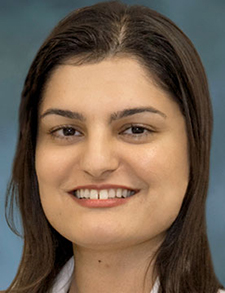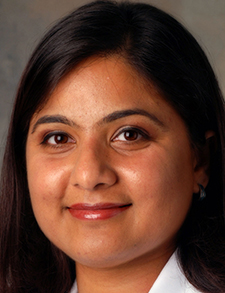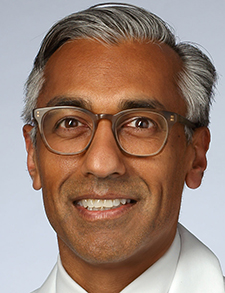 Hospitalists who decide to pursue additional board certifications to broaden their field of practice seldom take the same path. Regardless of whether they chose this road for a clinical interest or to further their careers, the road is personal and requires much thought and effort, dual specialists say.
Hospitalists who decide to pursue additional board certifications to broaden their field of practice seldom take the same path. Regardless of whether they chose this road for a clinical interest or to further their careers, the road is personal and requires much thought and effort, dual specialists say.

Dr. Abuali
Mayssa Abuali, MD, is board certified in general pediatrics, pediatric hospital medicine, and pediatric infectious diseases. Now the director of the Einstein Pediatric Inpatient Service at St. Christopher’s Children’s Hospital in Philadelphia, Pa., she decided to maintain her certification in general pediatrics while pursuing subspecialties because she believed that a strong foundation in general pediatrics was key to being an excellent physician.
She completed a fellowship in pediatric infectious diseases and was practicing as a pediatric hospitalist when pediatric hospital medicine (PHM) became recognized as a unique and free-standing field. “I believe that PHM requires unique knowledge and skills, and I wanted to become certified so that it could reflect my unique and varied clinical and academic skill set,” she said. Dr. Abuali is now practicing in all three fields.
Taking an unexpected turn
One provider had a profoundly personal journey to becoming credentialed as both an endocrinologist and a hospitalist. Harkesh Arora, MD, a physician with Lovelace Medical Group in Albuquerque, N.M., had always planned to return to India after completing her medical training. “In India, it doesn’t serve you very well to be a generalist,” she said. “I wanted to specialize right from the beginning.”

Dr. Arora
In her first job after fellowship training, Dr. Arora found herself juggling an entire clinic while trying to care for her two infants, who had been born less than 12 months apart. “The situation was not manageable since I faced a productivity-based work environment that bred hostility,” she said. “Now we talk big time about burnout. Back in 2012, that was not even a word in the medical literature.”
When Dr. Arora resigned, she vowed never to put her family in that situation again. She was forced to liquidate everything and leave for India. Unfortunately, she had to return to the U.S. due to a lack of support.
The question upon returning was not whether she should specialize in endocrinology or internal medicine, but how she could safely get back into the country to work and have no “red flags.” “For the J1 waiver jobs, there are more internal medicine and hospital-site employers than endocrine employers. I wanted an immigration-strong company/corporation, not necessarily endocrine-strong,” she said. “I just continued from there, and the rest is history.”
Dr. Arora now identifies as an endocrine hospitalist. “If you go by data, we are fewer than 1% in the country. Fewer than 50 of the 6,000 practicing endocrinologists in the U.S. practice as endocrine hospitalists,” she said. She looks to Mihail Zilbermint, MD, MBA, at Johns Hopkins in Bethesda, Md., as an authority on the role of an endocrinologist in a hospital setting. “Johns Hopkins has a similar model of endocrine-hospitalist service and is one of the largest in the nation (24 provider team).” In addition to her traditional roles, Dr. Arora was recently appointed as the director for inpatient diabetes management for all the Ardent hospitals nationwide.
Linking a different interest

Dr. Sridharan
Another clinician incorporated a third interest after being certified in geriatrics and hospital medicine. Anirudh Sridharan, MD, of Johns Hopkins Howard County Medical Center in Columbia, Md., first focused on geriatrics training. He found the pace of office visits to be stressful, though, and decided to switch to hospital-based work late in his fellowship. Since many hospital patients are older, he still found the opportunity to practice geriatrics, just in a different setting.
Dr. Sridharan then developed an interest in process improvement. “Our informatics systems are central to that. They’re often the lever we use to improve care.” Howard County Medical Center had an open opportunity at the time for a physician to work in informatics, and Dr. Sridharan was able to use a practice pathway that allowed him to learn on the job. After several years of intense study, he became board certified in informatics at the end of 2020. He now works as the chief medical information officer as well as the medical director of geriatrics.
Dr. Sridharan credits his time in his geriatrics fellowship for making him a more complete physician as well as giving him a better idea as an informaticist of what physicians need. “I think the perspective of being an attending for a couple of years helped me be a better informaticist,” he said.
Daily realities
Dr. Abuali said she now applies her clinical knowledge daily in all three of her fields. “There is much overlap between the three specialties. For example, many of the patients I care for as a pediatric hospitalist are admitted to the hospital with infections,” she said.
As an endocrine-trained hospitalist, Dr. Arora said she can still comprehensively cover the “bread and butter” issues of patient care, including diabetes, hypertension, and high cholesterol, while covering other acute-care issues. Apart from that, when a specific endocrine case is expected in her hospital, that patient is usually scheduled so she can see the patient and oversee the care. “For example, if a patient needs an insulinoma or an adrenal gland-related workup, the staff will call me or electively admit the patient during my work week since this is a specialized endocrine workup.” She is also happy to help her hospital colleagues when they call asking for advice on these cases.
Dr. Sridharan now works clinically as a hospitalist for about 25% of his time. Another 25% is spent on geriatric process improvement, such as collaborating with four local skilled nursing facilities. He meets with them at least once a month, sometimes once a week, to discuss patients and how to improve transitions of care.
The remainder of his time is spent on clinical informatics and how to improve the medical record system. “Everything just doesn’t happen inside our EHR [electronic health record]. You also must improve the processes around the use of the EHR,” Dr. Sridharan said. He tries to have a process improvement mindset when talking to frontline users to understand how they do their work. “Then you design your computer systems to augment that. When it works best, you provide people with clinically relevant information at the right time and hopefully reduce nurses’ and doctors’ cognitive burden.”
Process improvement is about taking things off clinicians’ plates and allowing them to concentrate on tasks where humans are needed, such as “gray areas” where computers cannot be relied upon to make good decisions, Dr. Sridharan said. Even minor tweaks to systems involve a team of informatics personnel and clinical users, however. “It would be nice if we could just snap our fingers and make it better, but you need all those experts and all those perspectives,” he said.
A positive result can be gratifying. “I get a lot of satisfaction in my work when they say, ‘You have made my job easier,’” he said.
Challenges still exist for dual specialists, however. “Wearing many hats as a dual specialist is challenging and enjoyable but at times results in being pulled in different directions at once as others try to tap into your many fields of expertise,” Dr. Abuali said. “To address this challenge, dual specialists have to refocus and carve out their own unique academic and clinical niches.”
Dr. Abuali finds the field of hospital medicine to be very welcoming, but the world of pediatric infectious diseases can feel a little smaller as more of these specialists pursue “micro niches” such as antibiotic stewardship, infection control, or transplant medicine. “Practicing in dual specialties does not allow time for a micro niche. While being ultra-specialized is often professionally rewarding, I prefer the challenge of maintaining broad interests,” Dr. Abuali said. “I cherish the ability to innovate and create within multiple fields through protocol creation, research, and medical education. I love the fact that I can function as a bridging leader to bring the fields of hospital medicine and infectious diseases together.”
Discovering a passion
The three clinicians encourage tapping into a “passion” or strong interest before pursuing an additional certification. After Dr. Arora’s first two internal medicine rotations as a resident, she realized she was a “numbers person.” “You can wake me up in the middle of the night, and I can fix the sugars just like that. That was my drive and passion, and the hospital setting turned out to be a blessing,” she said.
Looking back, Dr. Arora said her skill sets helped her decide where to specialize. “I knew somewhere inside me I would not be the person taking care of 15 problem lists simultaneously. I like to be very specific, preferably in one field only, and then do my best. That was my drive that led me to choose my specialty.”
Recognizing skill sets and primary interests can help others decide as well, she said. “I think it’s all about passion and your goals. If it excites you, and if you can make it work, you should definitely do it.”
“Pursue your passions within medicine, even if combining fields or dual specializing is viewed as unconventional by some,” Dr. Abuali said. “Being a dual specialist can vastly expand your circle and increase your opportunities within research/academia as well as within the job market. It can make career transitions smoother, allowing for greater flexibility, and capacity for transformation at any stage.”
Don’t underestimate the effort needed to make this happen, however. “It comes down to thinking about what motivates you, what brings you joy in your work,” Dr. Sridharan said. He needed this motivation when taking online courses and studying for the informatics boards while still practicing as a clinician. “The important thing is having some drive, some real love for [the new interest]. It does take effort and you need that kind of motivation to stick with it because it’s very easy to get distracted. There are just so many things in life that you’re dealing with, and you can understandably lose focus.”
Sue Coons is a medical writer in Chapel Hill, NC. She also has worked in the hospital patient access area for 10 years.